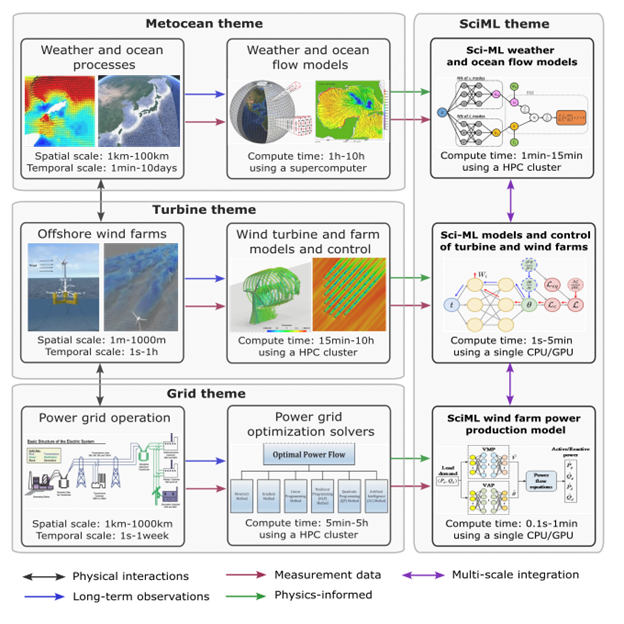SciML Theme
Draguna Vrabie, Lead
Goal: Develop a digital energy system model using scientific machine learning (SciML) to test and evaluate the impact of uncertain changes in the wind resource and metocean conditions on floating offshore wind turbines, wind farms and their control, and the integration of wind energy into the grid.
SciML represents an exciting opportunity to combine domain expertise with sophisticated learning algorithms to generate informed and accurate models representing complex processes that are more computationally efficient than existing approaches. This theme directly connects across the rest of the center.
- Metocean: SciML methods will allow us to construct fast surrogate models of the complex physics in the metocean environment. This will enable SciML to effectively exploit Earth systems models, such as the Department of Energy’s Energy Exascale Earth System Model (E3SM). These methods will enable the rapid simulation and exploration required to answer hypotheses relevant to optimizing floating offshore wind farms in varying ocean conditions in current and future climates.
- Turbine and farm: SciML methods will be used to develop differentiable models of the floating offshore wind turbines that could later be used for gradient-based optimization and closed-loop control. They will be specifically designed to be highly configurable to account for the very large number of critical parameters associated with individual turbine design, floating offshore wind turbine topology, and geographical placement in the context of variable and interacting subsystems, which is not computationally feasible with current approaches.
- Grid: SciML methods will allow us to train fast surrogate models to approximate grid optimization problems. This is needed because current methods are computationally slow for use in closed-loop, real-time control. SciML advances relevant to the grid will allow for rapid simulation and exploration of the complex interactions between the other themes.
By combining newly developed SciML models of the metocean, turbine, farm, and grid systems, Addressing Challenges in Energy: Floating Wind in a Changing Climate (ACE-FWICC) will generate an integrated digital energy system. Through this work, researchers can explore how the different parts of the complex system interact and identify points of challenge and places to reduce costs. The combined SciML approach tackles the key issue of model output discrepancies and interoperability, which is a persistent challenge with attempts to translate results from one domain model to another.

SciML Modeling of Coupled Floating Offshore Wind Turbine Systems
SciML models of the various aspects of the floating offshore wind energy system must be created from scratch. This requires developing mathematics, algorithms, and software tools that enable SciML modeling based on the underlying differential equations. Importantly, the individual SciML models will be consistent with one another, operating with standardized data formats, notation, and input/output requirements. This will maintain compatibility between representations of different parts of the energy system, facilitating interoperability and straightforward modeling across components.
Cost Reduction of Floating Offshore Wind Turbine Design and Operation via SciML
The SciML models can help dramatically accelerate research into identifying optimal sites and system designs for floating offshore wind turbine farms. This information is essential to safely and cost-effectively operate floating offshore wind turbines. However, the models must be scalable to reach long time scales and large numbers of potential farm design decisions. By developing highly flexible and efficient models, this work will also aid other ACE-FWICC Themes in identifying regions and configurations of interest for more detailed study.
Our team will develop and open-source the SciML modeling and optimization library for broader adoption across the different domain communities, which will enhance the reproducibility of ACE-FWICC research.